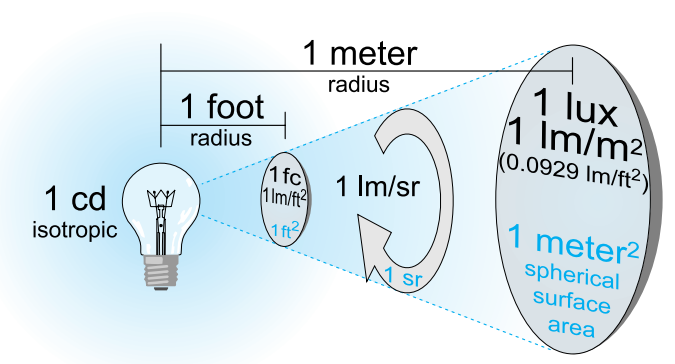1. What is the Irradiance and Illuminance Calculator?
Definition: This calculator determines irradiance (radiometric flux per unit area) and illuminance (photometric flux per unit area) based on luminous intensity and distance.
Purpose: It is used in lighting design, photography, and photometry to assess light distribution and intensity.
2. How Does the Calculator Work?
The calculator uses the following relationships:
\[
E = \frac{I}{d^2}
\]
\[
E_v = \frac{I}{d^2}
\]
Where:
- \(E\): Irradiance (W/m²)
- \(E_v\): Illuminance (lux or foot-candles)
- \(I\): Luminous intensity (cd)
- \(d\): Distance (m)
Unit Conversions:
- Distance: m, ft (1 ft = 0.3048 m)
- Illuminance: lux, fc (1 lux = 0.0929030436 fc)
Steps:
- Enter the luminous intensity (I) in candela (cd).
- Enter the distance (d) and select its unit.
- Click "Calculate" to determine irradiance (W/m²) and illuminance.
- Select the desired unit for illuminance (lux or fc).
3. Importance of Irradiance and Illuminance
Understanding these measures is crucial for:
- Lighting Design: Ensuring adequate light levels for visibility.
- Photography: Adjusting exposure based on light intensity.
- Safety: Assessing light exposure for human comfort.
4. Using the Calculator
Examples:
- Example 1: Luminous intensity = 1 cd at 1 m:
- \(E = 1 / 1^2 = 1 \, \text{W/m}^2\)
- \(E_v = 1 / 1^2 = 1 \, \text{lux} \approx 0.0929 \, \text{fc}\)
- Example 2: Luminous intensity = 1 cd at 1 ft (0.3048 m):
- \(E = 1 / (0.3048)^2 \approx 10.76 \, \text{W/m}^2\)
- \(E_v = 1 / (0.3048)^2 \approx 10.76 \, \text{lux} \approx 1 \, \text{fc}\)
5. Frequently Asked Questions (FAQ)
Q: What is the difference between irradiance and illuminance?
A: Irradiance measures radiometric flux (all wavelengths), while illuminance measures photometric flux (visible light only).
Q: Why does intensity decrease with distance?
A: Light spreads over a larger area as distance increases, reducing flux density.
Irradiance and Illuminance Calculator© - All Rights Reserved 2025
 Home
Home
 Back
Back
